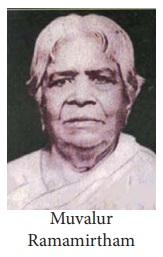Social Transformation in Tamil Nadu - Women’s Movements | 10th Social Science : History : Chapter 10 : Social Transformation in Tamil Nadu
Chapter: 10th Social Science : History : Chapter 10 : Social Transformation in Tamil Nadu
Women’s Movements
Women’s Movements
There
were several streams of women’s movements and organisations established in the
early twentieth century to address the question of women empowerment in Madras
Presidency. Women’s India Association (WIA) and All India Women’s Conference
(AIWC) are the important among them in Tamil Nadu. WIA was started in 1917 by
Annie Besant, Dorothy Jinarajadasa and Margaret Cousins at Adyar, Madras. The
Association published pamphlets and bulletins in different languages to detail
the problems of personal hygiene, marriage laws, voting rights, child care and
women’s role in the public. In the meantime, WIA formed the All India Women’s
Conference (AIWC) in 1927 to address the problem of women’s education and
recommended that the government implement various policies for the uplift of women.

Women’s
liberation was one of the important objectives of the Self-Respect Movement.
Self-respecters led by Periyar E.V.R. worked for gender equality and gender
sensitisation of the society. The movement provided a space for women to share
their ideas. There were several women activists in the movement. Muthulakshmi
Ammaiyar, Nagammai, Kannamma, Nilavathi, Muvalur Ramamirtham, Rukmani Ammal,
Alarmelmangai Thayammal, Nilambikai, and Sivakami Chidambaranar are prominent
among them.
There was
a custom of dedicating young girls to the Hindu temples as a servant of God,
known as devadasi. Though intended as
a service to god it soon got corrupted leading to extensive immorality and
abuse of the women. Dr. Muthulakshmi Ammaiyar, was in the forefront of the
campaign pressing for a legislation to abolish this devadasi system. The Madras
Devadasis (Prevention of Dedication) Act 1947 was enacted by the government.
In 1930, Muthulakshmi Ammaiyar introduced in the Madras
Legislative Council a Bill on the “prevention of the dedication of women to
Hindu temples in the Presidency of Madras”. The Bill, which later became the
Devadasi Abolition Act, declared the “pottukattu ceremony” in the precincts of
Hindu temples or any other place of worship unlawful, gave legal sanction to
devadasis to contract marriage, and prescribed a minimum punishment of five
years’ imprisonment for those found guilty of aiding and abetting the devadasi
system. The Bill had to wait for over 15 years to become an Act.
Related Topics